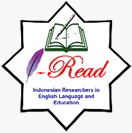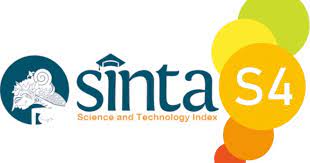Classroom Strategies through Translanguaging for Multilingualism Students
DOI:
https://doi.org/10.22219/englie.v2i1.14653Abstract
This research aims to discover translanguaging strategy in the process of teaching English material to multilingualism students. Due to the Indonesian country is a multicultural, the children got their mother tongue is a local language, not Bahasa Indonesia as the national ones. The Indonesian students acquire two languages n their daily life; local language and Bahasa Indonesia. Therefore, the role of English teacher is to explain English materials using English as the target language, local language and Bahasa Indonesia to increase students’ comprehension. This research used qualitative research with grounded theory design. In collecting the data, the researcher used interview technique to discover further information. In this research, the use of L1 was mostly used in the classroom rather than L2. The students could understand the material because the teachers’ effort to translate the language from Bahasa Indonesia to English and vice versa. This phenomenon was challenging because of the lack of students’ confidence to practice English. However, translanguaging decreased students’ anxiety in the class because they could understand English well by using two languages; Bahasa Indonesia and English. the findings are easy to be implemented by the following teachers in teaching multilingualism students for non-English speaking country, because translanguaging facilitates students and teachers to learn English using affordable way.
Downloads
References
Acar, A., & Robertson, P. (2009). The English International Language Journal Special Edition. The English International Language Journal, 5(March).
Creese, A. (2017). Translanguaging as an everyday practice. In New Perspectives on Translanguaging and Education. https://doi.org/10.21832/PAULSR7814
Creese, A., & Blackledge, A. (2019). Translanguaging in the Bilingual Classroom : A Pedagogy for Learning. The Modern Language Journal, 94(1), 103–115.
Cummins, J. I. M. (2019). Multilingualism in the English-language Classroom : Pedagogical Considerations. Teachers of English to Speaker of Other Languages, Inc. (TESOL), 43(2), 317–321.
Duarte, J. (2018). Translanguaging in the context of mainstream multilingual education. International Journal of Multilingualism, 0(0), 1–16. https://doi.org/10.1080/14790718.2018.1512607
Duarte, J. (2019). Translanguaging in mainstream education: a sociocultural approach. International Journal of Bilingual Education and Bilingualism, 22(2), 150–164. https://doi.org/10.1080/13670050.2016.1231774
Ellis, R., & Shintani, N. (2014). Exploring Language Pedagogy through Second Language Acquisition Research. In Exploring Language Pedagogy through Second Language Acquisition Research. https://doi.org/10.4324/9780203796580
Galletta, A. (2013). Mastering the Semi-Structured Interview and Beyond. New York: New York University Press.
García, O., Sylvan, C. E., & Witt, D. (2019). Pedagogies and Practices in Multilingual Classrooms : Singularities. The Modern Language Journal, 95(3), 385–400.
García, O., & Wei, L. (2013). Translanguaging: Language, bilingualism and education. In O. Garcia & L. Wei (Eds.), Translanguaging: Language, Bilingualism and Education (First). https://doi.org/10.1057/9781137385765
Haim, O. (2019). Investigating Transfer of Academic Proficiency Among Trilingual Immigrant Students : A Holistic Tri-Directional Approach. The Modern Language Journal, 99(4), 696–717.
John W. Creswell. (2012). Educational Research: Planning, Conducting and Evaluating Quantitative and Qualitative Research (Fourth; J. W. Cresswell, ed.). Boston: Pearson.
Nation, P. (2003). The Role of the First Language in Foreign Language Learning. Asian EFL Journal, 66(3), 651. https://doi.org/10.2307/414662
Palmer, D., & Martinez, R. A. (2019). Teacher Agency in Bilingual Spaces : A Fresh Look at Preparing Teachers to Educate Latina / o Bilingual Children. American Educational REsearch Association, 37(2013), 269–297. https://doi.org/10.3102/0091732X12463556
Saldana, J. (2011). Fundamentals of Qualitative Research (J. Saldana, ed.). New Yorl: Oxford University Press.
Zhu, H., Li, W., & Jankowicz-Pytel, D. (2019). Translanguaging and embodied teaching and learning: lessons from a multilingual karate club in London. International Journal of Bilingual Education and Bilingualism, 0050. https://doi.org/10.1080/13670050.2019.1599811
Downloads
Published
How to Cite
Issue
Section
License
Copyright (c) 2021 Nursanti, R. R.

This work is licensed under a Creative Commons Attribution-ShareAlike 4.0 International License.
Authors who publish with English Learning Innovation (englie) agree to the following terms:
- For all articles published in English Learning Innovation (englie), copyright is retained by the authors. Authors give permission to the publisher to announce the work with conditions. When the manuscript is accepted for publication, the authors agree to automatic transfer of the publishing right to the publisher.
- Authors retain copyright and grant the journal right of first publication with the work simultaneously licensed under a Creative Commons Attribution-ShareAlike 4.0 International License that allows others to share the work with an acknowledgement of the work's authorship and initial publication in this journal.
- Authors are able to enter into separate, additional contractual arrangements for the non-exclusive distribution of the journal's published version of the work (e.g., post it to an institutional repository or publish it in a book), with an acknowledgment of its initial publication in this journal.
- Authors are permitted and encouraged to post their work online (e.g., in institutional repositories or on their website) prior to and during the submission process, as it can lead to productive exchanges, as well as earlier and greater citation of published work (See The Effect of Open Access).
This work is licensed under a Creative Commons Attribution-ShareAlike 4.0 International License.

















1.png)












